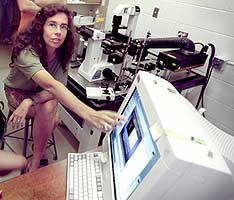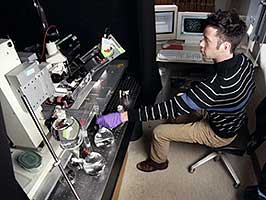 |
|||||||||
|
Research Feature Stories: Other News: |
Has Potential to Revolutionize Medical Field
“Every once in a long while a new field of science and technology emerges that enables the development of a new generation of scientific and technological approaches, and research and clinical tools and devices. Nanotechnology holds such promise.” These words began the report of a recent National Institutes of Health conference, “Nano-science and Nanotechnology: Shaping Biomedical Research”, and characterize a relatively new field that holds promise of advances in medical research and care.
 |
 |
|
Bioengineering Dr. Viola Vogel (left) works on a scale of one billionth of a meter in designing new biomedical tools. A researcher conducts a study at the UW Center for Nanotechnology (right), which opened in 1997. |
|
Nanotechnology is the creation and utilization of materials and devices at the level of atoms or molecules. The emerging field brings together studies in science and technology on the scale of a nanometer—one billionth of a meter, or a thousand times narrower than a human hair. UW’s Center for Nanotechnology opened in 1997 and has grown to 65 faculty members from the liberal arts, medicine, engineering, and pharmacy. Its impact on the field of medicine could be revolutionary. It has the potential, for example, to change and improve drug and gene delivery systems, develop diagnostic tools that could be placed in cells and create biocompatible materials for implants.
 |
|
Dr. Gretchen Baneyx, post doctoral fellow in bioengineering created the images of cellular proteins transferring energy to assemble a matrix. |
Dr. Viola Vogel, associate professor of bioengineering, directs the center. Her own research is on controlling the assembly of molecular building blocks into supramolecular complexes with predictable architecture. Her current projects include the study of single molecule mechanics, the matrix assembly of proteins and organic-matrix controlled mineralization.
Last year the UW hosted a nanoscale science and technology workshop sponsored by the Center for Nanotechnology, University Initiatives Fund, the National Science Foundation, and the UW Pacific Northwest National Laboratory’s Joint Institute for Nanoscience and Nanotechnology; and co-sponsored by the Pacific Northwest National Laboratory and the Department of Energy.
|
| UW AMC Medical Center | UW School of Medicine | Harborview | UW MC | Search UW AMC | UW Home | Contact Us | ©2001-2002, University of Washington Academic Medical Center. All rights reserved. Please honor our copyrights. |
|